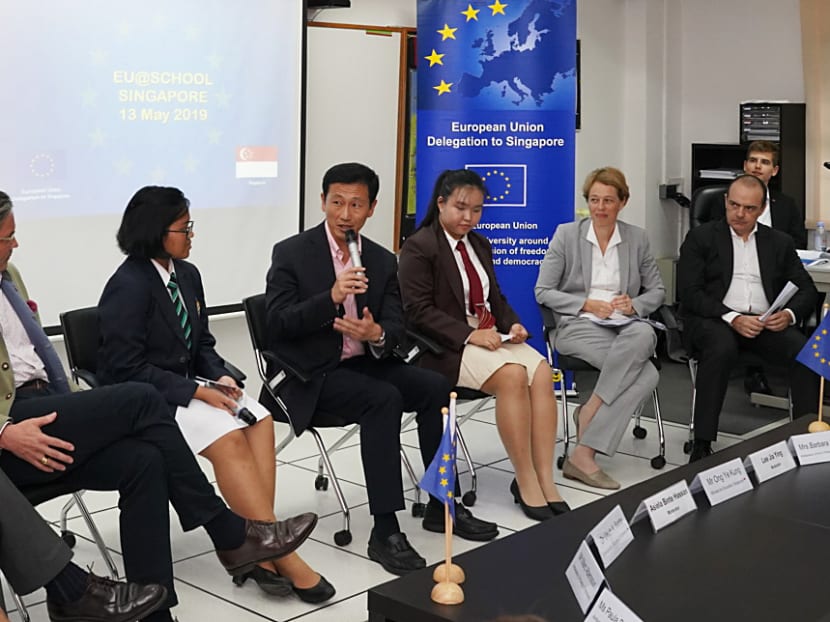EU ambassadors to give talks at schools, raise awareness of the EU and its relations with Singapore
SINGAPORE — The next generation of young Singapore business leaders, diplomats and politicians are about to get a face-to-face encounter with ambassadors representing the world’s largest trading bloc, the European Union (EU).

Education Minister Ong Ye Kung speaking to Ambassadors of several European Union countries and students at a dialogue session.
SINGAPORE — The next generation of young Singapore business leaders, diplomats and politicians are about to get a face-to-face encounter with ambassadors representing the world’s largest trading bloc, the European Union (EU).
In a new programme, the ambassadors here from 17 EU member states, as well as the EU’s ambassador, will be taking their diplomatic work to 21 secondary school and junior colleges across the island over the next two weeks in a bid to raise awareness of the EU and its relations with Singapore.
“The project aims to promote 21st century competencies by developing global awareness and cross-cultural skills amongst our students, and instilling in them an appreciation of different cultures and languages via an introduction to the rich and diverse cultures of Europe, the EU and Singapore’s Education Ministry said in a joint statement.
Although the EU in Brussels may be a little distracted with efforts by one member state, Britain, to leave the bloc, its representatives here see big opportunities in the recently-concluded EU-Singapore Free Trade Agreement, for example. (The British High Commissioner is not among those diplomats involved in the programme.)
The "European Union comes to your school project" (EU@School) started on Monday (May 13) with a dialogue session with Education Minister Ong Ye Kung at the Ministry of Education Language Centre, where Mr Ong and several of the ambassadors engaged students about the importance of foreign language proficiency.
When asked about the timing of the project, the Romanian Ambassador Florin Tacu noted a growing impetus in EU-Singapore relations, given that both parties signed three significant agreements in October last year (2018), including the FTA.
He added in a statement: “Singapore’s successful role as coordinator of Asean-EU relations adds a regional dimension to the EU@School project as well. With the election campaign in Europe in full swing, my colleagues and I are looking forward to insightful discussions with the students and are eager to learn more about their perspectives and expectations in both Asean-EU and our respective bilateral relations."
One student asked if Singaporeans should be encouraged to be proficient in a third foreign language in addition to the two languages most already have.
Mr Ong responded that he suspects that in many European countries, many students already know three languages. “It occurred to me that bilingualism is our advantage in Singapore. Yet in Europe, it is quite basic,” he said.
Mr Ong attributed this to the diversity of the European continent and their different languages, and noted that Singapore was also part of a diverse region.
While he encouraged the learning of all languages, he said that Singaporeans should start with learning English as a common language given that Singapore is a multi-racial country.
“For many of us, it is important to learn our mother tongue, because as a young country, mother tongue gives us access to what our ancestral knowledge is. So it’s important for us to master this tool,” he said.
“But beyond that, I think we can explore and encourage learning third languages,” he added.
However, he said that there are different types of third languages.
Firstly, there are the languages of European countries or Japan, which give Singaporeans access to good universities, jobs and networks for economic opportunities.
The second group of third languages are regional languages, such as Arabic. “This represents opportunities for us in a small market like Singapore, that at some point, our people may go out into the region and be able to operate in those markets,” he said.
“The third, which I find most important, is the language of your friends. So you can learn Chinese, Malay or Tamil.”
That is especially important to Singapore because people can be drawn together when they know more about another culture of Singapore and the community, he added.
Polish Ambassador Magdalena Bogdziewicz said that even as technology makes translation easier, learning a foreign language is also about learning the cultures and values of people in other regions of the world.
Mr Ong added: “It’s a very worthwhile investment of your time. The more languages you know, the easier the next language comes. And the more you know, the more your eyes open up to different parts of the world.”
Ms Bogdziewicz added in a separate statement: “Even if the 21st century is hailed ‘the Age of Asia’, the EU remains one the most important and successful peace and economic projects, worldwide. It can offer important lessons on the regional integration in this part of the world, in particular Asean.”









